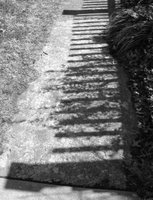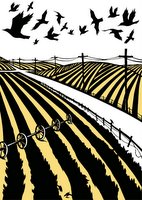A sprouting is going to go on.

I started my day with a mug of coffee, a dog in my lap, another dog by my side, and a couple of student plays to read. That task finished up in short order, I turned to Annie Dillard's Pilgrim at Tinker Creek, which I've been wanting to reread ever since my solstice eve post. When I packed my box of books on Saturday afternoon--because I rarely drive anywhere where I'm going to stay for more than a couple of days without taking a box of books along--I grabbed Dillard's book along with most of the others on the list to your right. I'm thinking of my spring break as a hiatus not from work altogether, but away from one kind of labor and in another, and so I piled up the short stack of writers who have moved me, one way or another, with their approaches to the world around them, as well as to recording that world. Annie Dillard is on that list. So are Anne Lamott and A.R. Ammons. I'm giving Kathleen Norris a try, once again, for reasons that I may wait and explain tomorrow, since tomorrow marks a week since my sinking, which makes both more and less sense to me now than it did seven days ago. Joseph Cornell? I think I'd just like to carry him everywhere, from now on. And the walk I took this afternoon put Wendell Berry up there, too, in a way he simply hadn't been before I came down into his neck of the woods.
"There seems to be such a thing as beauty, a grace wholly gratuitous," Dillard claims early in her book. "The extravagant gesture is the very stuff of creation.... The whole show has been on fire from the word go." She devotes much of the early section of Pilgrim at Tinker Creek to the idea of learning to see gratuitous grace and extravagant gestures, in large part because, as she argues, "beauty and grace are performed whether or not we will or sense them. The least we can do is try to be there." "I went out to see what I could see," she tells us of her rambles through Virginian woods and mountains. After two and a half chapters, I went out into this Lexington neighborhood, headed for a pair of bookstores about a mile from here, with the intention of seeing what I could see--and with Dillard's warning echoing in my ears: "This looking business is risky."
 One thing the walk confirmed for me is that I really may not be cut out for even small city life. Even though I sometimes complain about the overincubating force of my village's smallness, and even though there were birds and trees and flowers to see here today, nature is smaller, more tightly circumscribed, here than where my heart is. I did see shadows and buds and slants of light I loved; witness this fence I walked along on the ground, for instance. Lexington is closer to spring than we are up north, even though I'm only a couple hundred miles south of home. By the time I reached the corner of my friend's neighborhood streets and the main artery that would take me to the bookstores, I had encountered the second of my real beauties,
One thing the walk confirmed for me is that I really may not be cut out for even small city life. Even though I sometimes complain about the overincubating force of my village's smallness, and even though there were birds and trees and flowers to see here today, nature is smaller, more tightly circumscribed, here than where my heart is. I did see shadows and buds and slants of light I loved; witness this fence I walked along on the ground, for instance. Lexington is closer to spring than we are up north, even though I'm only a couple hundred miles south of home. By the time I reached the corner of my friend's neighborhood streets and the main artery that would take me to the bookstores, I had encountered the second of my real beauties,  a tree decked out in red buds, very different from the tiny knobby branch-ends that are dogwood buds, all over trees all over town (see the bird's nest photo above for an example). But on the walk from there to the stores, there was little I wanted to photograph for you. The one thing I really regret is that I came home (the last time, later in the day) with my hands empty of crocus photos, even though their gold and lavender and deep purple are bedecking lawns everywhere.
a tree decked out in red buds, very different from the tiny knobby branch-ends that are dogwood buds, all over trees all over town (see the bird's nest photo above for an example). But on the walk from there to the stores, there was little I wanted to photograph for you. The one thing I really regret is that I came home (the last time, later in the day) with my hands empty of crocus photos, even though their gold and lavender and deep purple are bedecking lawns everywhere.Eventually I did make it to the first bookstore, and on any other day, this post might have been about my longstanding love affair with used bookstores. This first one, which was closed the last time I made the trip down here, was one of the most aesthetically pleasing used bookstores I've ever encountered: no precarious stacks of books on the floor, no dodgy underlining and dogearing in books on the shelves, and no apparent end to its parade of rooms, opening out before me, each after the other, beckoning me to step in and spend $40 on a slim, blue nineteenth-century volume called The Basics of Obstetrics, for instance, though I was frankly too rattled by an image of supporting the perineum during birth (not to mention the plethora of ways delivery can go horribly wrong) to regret the prohibitive price. Even the bathroom was stylish, walls and ceiling covered in rhododendron print wallpaper. I did almost take a picture of the wallpaper. But then I found Wendell Berry hanging on the wall.
Well, okay, it was actually a series of his poems that this particular bookstore has printed by a local fine arts press called Larkspur a couple of times a year. The one that caught my eye--enough so that I started scrawling lines from it on my hand--was Berry's "Manifesto: The Mad Farmer Liberation Front" (1973), which I am so very tempted to reprint here in full for you. Instead, follow the title's link if you'd like to read the poem in full; I will give you my favorite bits (the second stanza and the final stanza):
So, friends, every day do something
that won't compute. Love the Lord.
Love the world. Work for nothing.
Take all that you have and be poor.
Love someone who does not deserve it.
Denounce the government and embrace
the flag. Hope to live in that free
republic for which it stands.
Give your approval to all you cannot
understand. Praise ignorance, for what man
has not encountered he has not destroyed.
. . . . . . . . . . . . . . . . . . . . . . . . . . . . . . . . .
... Swear allegiance
to what is nighest your thoughts.
As soon as the generals and the politicos
can predict the motions of your mind,
lose it. Leave it as a sign
to mark the false trail, the way
you didn't go. Be like the fox
who makes more tracks than necessary,
some in the wrong direction.
Practice resurrection.
 What went on my hand--what is still on my hand, at the end of the day--were "Practice resurrection" and "So, friends, every day do something / that won't compute." By the time I left the store, I had a broadside art print of this poem, wrapped up in brown paper and a flattened priority mail envelope, an early birthday present for myself, just right for the contrarian I'm working my back around to becoming after all these years. It'll get framed and hung, though where, I'm not yet sure. I also carried out of there a letterpress edition of Berry's poem "The Farm," originally published in The Hudson Review. My heart has a large soft spot for "The Farm" because I once wrote an essay analyzing it in comparison with Virgil's Georgics, to which I still think it bears comparing. There's far more to say about Berry's "The Farm," but for now let this suffice: the reason I barely batted an eye when the shop's owner said, "We also have a Larkspur edition of 'The Farm'" is not only that the book itself is a lovely, lovely object (letterpress makes my eyes go wide, and I can't stop touching its grooves on the page; the woodcuts that illustrate the volume are also perfect, somehow both stark and lush) but also that this poem makes both work and worship make sense to me:
What went on my hand--what is still on my hand, at the end of the day--were "Practice resurrection" and "So, friends, every day do something / that won't compute." By the time I left the store, I had a broadside art print of this poem, wrapped up in brown paper and a flattened priority mail envelope, an early birthday present for myself, just right for the contrarian I'm working my back around to becoming after all these years. It'll get framed and hung, though where, I'm not yet sure. I also carried out of there a letterpress edition of Berry's poem "The Farm," originally published in The Hudson Review. My heart has a large soft spot for "The Farm" because I once wrote an essay analyzing it in comparison with Virgil's Georgics, to which I still think it bears comparing. There's far more to say about Berry's "The Farm," but for now let this suffice: the reason I barely batted an eye when the shop's owner said, "We also have a Larkspur edition of 'The Farm'" is not only that the book itself is a lovely, lovely object (letterpress makes my eyes go wide, and I can't stop touching its grooves on the page; the woodcuts that illustrate the volume are also perfect, somehow both stark and lush) but also that this poem makes both work and worship make sense to me: Be thankful and repayBerry is talking about agricultural labor here, but I'd like to believe that any "good work" done "in gratitude, / Kindly, and well" can be prayer, can work against the ambition and greed and violence militating against it. Berry's rural ideals, filled as they are with the cyclical difficulties and deaths that structure farm life in particular, actually help me, just as much as walking along busy streets today helped me, to think about where it is I live, and why I might want to keep living there after all.
Growth with good work and care.
Work done in gratitude,
Kindly, and well, is prayer.
You did not make yourself,
Yet you must keep yourself
By use of other lives.
No gratitude atones
For bad use or too much.
This is not work for hire.
By this expenditure
You make yourself a place;
You make yourself a way
For love to reach the ground.
In its ambition and
Its greed, its violence,
The world is turned against
This possibility,
And yet the world survives
By the survival of
This kindly working love.
My heart already full of those poems, I stepped across the street to a second used bookstore (two! in a block! a mile from where I sit! my heart sings at the very thought), hoping to find a copy of Annie Dillard's Teaching a Stone to Talk, my book quest for this trip. Though I went disappointed in that particular quest, I surfaced with something better than I could have imagined, a used (though perfect) copy of Archie Ammons's Tape for the Turn of the Year(1965). Do you know this poem? If not, you're missing something extraordinary.
 In 1963, just months before Cornell hired him and he decamped for Ithaca, where he lived for the remaining 45 years of his life, Ammons saw a roll of adding-machine tape in a store and thought he could turn it into a poem. "I / thought of the poem / then, / but not seriously," he tells us early in the poem. But two weeks later, on 6 December 1963, he threaded one end of the tape into his typewriter, declared, "today I / decided to write / a long / thin / poem," and started the project that would occupy him for about five weeks: producing a poem confined, arbitrarily, to this single narrow roll of paper, his tape for the turn of the year. I am indeed going to have to put off telling you all about this poem, and about how it has become the happy surprise of my evening, until tomorrow--for the time stamp went onto this post when I started writing, and it's been a good couple of hours since then. But I will leave you, for tonight, with a couple of clippings from Ammons's tape (with some of the spacing screwed up, alas), and an assurance that this particular sprouting of mine is going to go on, in the manner of this blooming-tomorrow daffodil from my friend's front yard:
In 1963, just months before Cornell hired him and he decamped for Ithaca, where he lived for the remaining 45 years of his life, Ammons saw a roll of adding-machine tape in a store and thought he could turn it into a poem. "I / thought of the poem / then, / but not seriously," he tells us early in the poem. But two weeks later, on 6 December 1963, he threaded one end of the tape into his typewriter, declared, "today I / decided to write / a long / thin / poem," and started the project that would occupy him for about five weeks: producing a poem confined, arbitrarily, to this single narrow roll of paper, his tape for the turn of the year. I am indeed going to have to put off telling you all about this poem, and about how it has become the happy surprise of my evening, until tomorrow--for the time stamp went onto this post when I started writing, and it's been a good couple of hours since then. But I will leave you, for tonight, with a couple of clippings from Ammons's tape (with some of the spacing screwed up, alas), and an assurance that this particular sprouting of mine is going to go on, in the manner of this blooming-tomorrow daffodil from my friend's front yard:[from 9 Dec.]They are. Just you watch.
the record
can't reproduce event:
even if I could know &
describe every event, my
account would
consume the tape & run
on for miles into air:
those who rely on facts
have not heard:
[from 11 Dec.]
intellections are
scaffolds, trellises
we wish some vine of
feeling would take to
& possess
completely:
. . . . . . . . . . . . . . . . .
...we build these
structures because we
have hope, at least:
we're
flat & lifeless,
but these erections,
they have hollow spaces,
room: we mean
to change--that is,
a sprouting is going
to go on: good, bad, &
indifferent are gonna
clutter up all around
source for tonight's middle image: I feel strongly enough about this one that I'm not even going to reduce the font size, as per usual. BuyOlympia.com is a terrific website of alternative crafts and all around awesome goods--it's like Elsewares but with a slightly more handmade aura around everything. Nikki McClure, whose papercut image "Field" appears above, is one of the most interesting artists on the site. Far from trying to cheat her of business, I'm trying to get you all to go over there and buy her lovely cards and posters and shirts. I'm a particular fan of her jellyfish t-shirt and may have to add it to the summer menagerie.


4 Comments:
ok, you make me crazy. how do you write so MUCH, and coherently, every day? it's all I can do to put together 100 words, maybe. is that your geek superpower? (mine is: can stop rollicking conversations dead in their tracks)
I'm on vacation for a couple of weeks, and this week is really vacation--as in, I'm away from home and committed to giving myself a break from what I've been up to lately.
But yes, it's also my geek superpower.
Dr. S...
Thank you for showing/sharing those poems to me. I am now thinking of including the Berry poem, in my job talk. It says it so well, as do you...
You're welcome, and thanks, guy!
Post a Comment
<< Home